After an early Sunday evening dinner at my grandparents’ apartment, my family often watched “The Twentieth Century” on CBS at 6:30. First aired in 1957 and narrated by Walter Cronkite, the half-hour show ran for 107 episodes through the early ‘60’s. Verdun, Lindbergh, the Depression, the Enola Gay, Nuremberg, Korea. My parents and grandparents had lived, fought, and suffered through those moments. 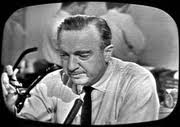 History was both enshrined and present. Fifteen million other Americans watched with us. Then, when Jack Ruby shot Lee Oswald and Neil Armstrong stepped on the moon, the instant became history instantaneously.
History was both enshrined and present. Fifteen million other Americans watched with us. Then, when Jack Ruby shot Lee Oswald and Neil Armstrong stepped on the moon, the instant became history instantaneously.
“After 1960 an interest in history appeared among peoples largely untouched by such in the past,” writes John Lukacs in The Future of History. In the West, the taste for popular history began with documentaries on quite recent events. The Soviet army, forcing the Germans out of Stalingrad in a black-and-white winter, now surrounded NATO forces live and in color in Berlin. “The present appetite for history,” he continues, “may be something like a curiosity compounded with anxiety: the world is changing fast around us, whence we consciously try to preserve objects from a historical past – as well as to find subjects that connect us personally with an imaginable and not so distant past … encountering some things and people who were real.”
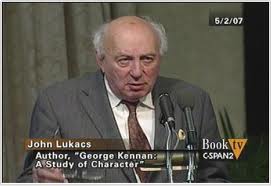 But Lukacs rarely allows himself to be satisfied with a single insight. (He even critiques his book’s title: “‘The future of history’ is a cavalier phrase … the projection [and often an exaggeration] of some things we see occurring at the present.”) He speculates and worries about the fixation on popular history: “When people are thus overwhelmed by ‘the march of history,’ this suggests that their freedom of will is hopelessly curtailed, that their aspirations are bereft of much meaning, that they are supernumeraries.” To listen to him attempting to reconcile conflicting ideas and facts is the pleasure and instructiveness of The Future of History. It teaches us how to respect our disciplines.
But Lukacs rarely allows himself to be satisfied with a single insight. (He even critiques his book’s title: “‘The future of history’ is a cavalier phrase … the projection [and often an exaggeration] of some things we see occurring at the present.”) He speculates and worries about the fixation on popular history: “When people are thus overwhelmed by ‘the march of history,’ this suggests that their freedom of will is hopelessly curtailed, that their aspirations are bereft of much meaning, that they are supernumeraries.” To listen to him attempting to reconcile conflicting ideas and facts is the pleasure and instructiveness of The Future of History. It teaches us how to respect our disciplines.
For Lukacs, history “as a branch of entertaining literature” is a new phenomenon, spun out of German romanticism – so new that one must continue asking what it actually is, what purposes it serves, and how best to sustain its practice. Although the History Channel provides non-stop programming, “by 1980 the numbers of undergraduate history majors in American institutions of higher learning had fallen to one-fourth what they had been twenty years earlier.” Ken Burns’ “The Civil War” is being shown again on PBS to mark the 150th anniversary of the war, but my daughters graduated from high school and college without having been exposed to the significance of the Lincoln-Douglas debates, Gettysburg, and the consolidation of American nationalism. It would have been news to them that Lincoln and Marx were contemporaries.
During his lifetime, as various historical approaches (he calls them “fads”) have arisen and ebbed, Lukacs has refused to regard history as a science and has scorned “deterministic” modes of historicism. In specifying his longtime distastes, he may sound like a reactionary. But strangely, as he questions all approaches including his own, he may just as often sound like a revolutionary. You can hear both tendencies in sentences like this:
“There is much that historians have yet to learn. Especially now when the chaotic crisis in all kinds of disciplines – indeed, of civilization itself – has reached the historical profession. They have to confront the conditions of their knowledge.”
Here’s a partial list of other issues treated in The Future of History: the state of historianship, the “absurdities of social history,” the future of books and reading, the necessary revisionism of history, the critical role of amateur historians, the errors of social histories, the shortsightedness of American liberal historians, the appetite for biographies “in a world of increasing, overwhelming and oppressive abstractions,” and the difference between public opinions versus popular sentiment and how they affect history.
But for most readers of this review, Lukac’s chapters on the relationship between history and literature (fiction and poetry) will perhaps be the most illuminating and suggestive.
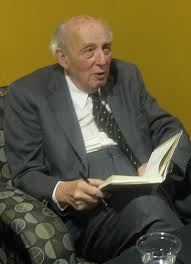 Lukacs has published more than thirty books since 1953, including The Passing of the Modern Age (1970), The Hitler of History (1997), Five Days in London, May 1940 (2002), and George Kennan: A Study of Character (2007). But in The Future of History, he says that “my most extraordinary book” is not a work of history at all but A Thread of Years (1996), comprising sixty-nine “chapterettes,” each titled with a year from 1901 to 1969 and consisting of two parts. The first part is a vignette depicting the lives of ordinary people. The second part is a dialogue between the narrator and a conversant who “challenges either the historicity or the accuracy of the vignette.”
Lukacs has published more than thirty books since 1953, including The Passing of the Modern Age (1970), The Hitler of History (1997), Five Days in London, May 1940 (2002), and George Kennan: A Study of Character (2007). But in The Future of History, he says that “my most extraordinary book” is not a work of history at all but A Thread of Years (1996), comprising sixty-nine “chapterettes,” each titled with a year from 1901 to 1969 and consisting of two parts. The first part is a vignette depicting the lives of ordinary people. The second part is a dialogue between the narrator and a conversant who “challenges either the historicity or the accuracy of the vignette.”
Although he points out that A Thread of Years “is neither a history nor a novel,” Lukacs draws our attention to it because he believes that the futures of history and literature will be intertwined. History describes. The novel depicts. Although the historian relies mainly on primary sources, his or her narrative must still imagine the thoughts of its protagonists. The revolutionary part of Lukacs points us toward the crossing of genres – and not just for historians.
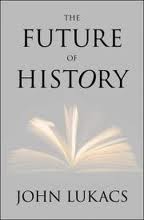 He writes, “Our knowledge of history is of course less than the entire past, but it is also more than the recorded past … The value of everything, material as well as intellectual or spiritual, is what people think it is … And what people think and believe – and what people thought and believed – are matters (yes: matters) that, all of their documented evidences notwithstanding, are difficult to trace … But they are not the obvious outcomes of some kind of Zeitgeist. I repeat: recognize that people do not have ideas. They choose them.”
He writes, “Our knowledge of history is of course less than the entire past, but it is also more than the recorded past … The value of everything, material as well as intellectual or spiritual, is what people think it is … And what people think and believe – and what people thought and believed – are matters (yes: matters) that, all of their documented evidences notwithstanding, are difficult to trace … But they are not the obvious outcomes of some kind of Zeitgeist. I repeat: recognize that people do not have ideas. They choose them.”
This leads to why he recommends that historians read Flaubert’s Sentimental Education for its “implicit and often deep-going history … His novel abounds with descriptions of changing sensitivities, of mutations of opinions and transformations of attitudes.” In contrast, War and Peace “reflects a kind of ideological, rather than historical, thinking.”
But does a singular type of “history” exist, or are there only “histories”? (Are there only “poetries”?) Lukacs lifelong topic has been “the problem of history in a mass democratic age” and his ideal prototypical historian is Tocqueville, able to discern the specific qualities of democratic history. Lukacs asserts that both the 20th century novelist and the historian “became aware of the impossibility (and artificiality) of the impartial, detached stance.” Nevertheless, his prescriptive “singular, authentic and down to earth” mode of history strikes me as necessarily partial, at least to some noticeable degree.
Guy de Maupassant wrote just a single essay in the form of a preface to Pierre et Jean. But it contains a phrase that thrills Lukacs even after all these years. Maupassant states that the role of the realistic novelist “is not to tell a story, to amuse us or to appeal to our feelings, but to compel us to reflect, and to understand the darker and deeper meaning of events” (Lukacs’ italics). This is the broadminded, absorptive, and reflective writerly characteristic that Lukacs wishes to see in histories. He takes up Aristotle’s definitions of history (“what has happened”) and poetry (“what may happen”), then hears “what might have happened,” a question for modern historians, in the novel.
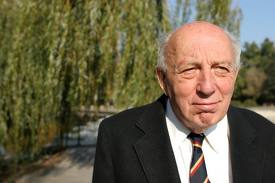 Elizabeth Bishop spoke of “the feeling that the contemporary language is not equivalent to the contemporary fact” – a feeling that creates the cause of poetry. Lukacs, too, is seeking adequate language when he says, “the purpose of history, too, is less a definite establishment of truths than it is the reduction of untruths.” I hear this last as the reduction of untruthful language. But for both Bishop and Lukacs, one must pretend that an adequate language may be found. In this way, both history (“all historical events are mysterious”) and reality are forced into being – and the reader may dare to believe that the people speaking and portrayed in the histories and the poems are, for once, real.
Elizabeth Bishop spoke of “the feeling that the contemporary language is not equivalent to the contemporary fact” – a feeling that creates the cause of poetry. Lukacs, too, is seeking adequate language when he says, “the purpose of history, too, is less a definite establishment of truths than it is the reduction of untruths.” I hear this last as the reduction of untruthful language. But for both Bishop and Lukacs, one must pretend that an adequate language may be found. In this way, both history (“all historical events are mysterious”) and reality are forced into being – and the reader may dare to believe that the people speaking and portrayed in the histories and the poems are, for once, real.
[Published by Yale University Press on April 26, 2011. 177 pages, $26.00 hardcover]
Lucacs
Do I dare, as I speak, believe I am real? I tend to settle for an “educated” guess. Thanks for your excellent attention to the quirks of Lucacs. I personally am paradoxical with respect to history, both knowing it “real” and certain we make it all up. As to my knowing and my certainty, these seem infinitely open to revision. Still, none of this is a problem at the moment: just wanted to compliment the review.
Lukacs as conservative
If I’m not mistaken, Lukacs has even called himself a “reactionary.” For those who resent anyone claiming to be a “central” authority, ie., claiming to have an all-encompassing, authoritative point of view without affiliation, Lukacs makes their list as an enemy. But Lukacs has never insisted on some sort of exclusivity, except to say he won’t adopt deterministic historical techniques. You did a good job of showing that at the end of his career he is still asking big questions about history and himself. I recommend his book on Kennan, a brilliant diplomat whose thoughtfulness seems a perfect match for Lukacs’ own persuasions.